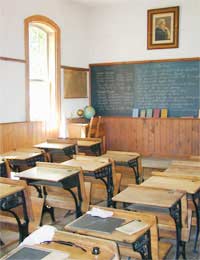Classroom Ice Breakers

A high percentage of kids find the classroom to be a dull, uninteresting room where they are forced to undertake boring, difficult tasks. This negative association can change if you start using the area for interesting and fun experiences. Ice breaker games can change the mood of kids in minutes, which will have a ripple effect on the rest of the day’s lessons. Start your lesson with an interactive game that uses the classroom effectively. The kids will begin associating school and the classroom with interest and enjoyment.
The classroom can become an exciting playground for learning if you put a little imagination and creativity into your lesson plans.
Here are a few fun ice breaker games that are ideal for kids in the classroom:
Pin your Birthday
Using the classroom map, hand out chart pins and get one at a time to place the pin on the city or town where they were born. This simple game gets everyone talking and starts up plenty of friendships.Three is a Magic Number
Get the class to break into groups of three and ask them to uncover three facts that they have in common. Ban commonalities such as age, hair colour, height etc. Get them to find out three unusual commonalities. Then have each team explain what they have in common to the group. A simple and interesting game that helps break barriers.Question Board
Write a question on the board such as 'my favourite sport is..' or 'I would most like to...'. Ask each of the kids to answer the question (one at a time. Change the question once everyone has answered. This gets everyone interacting and is one of the most effective games for finding out about your group.Incorporate Topics
Ice breakers can be great fun and an effective educational tool, but if used incorrectly can send your lesson plans off into the wrong direction. Before undertaking an ice breaker game you must take into account the subjects and material you have planned for the day and try to incorporate aspects of the days learning into the ice breaker. For example, playing a round of Bingo as a warm-up to a Math lesson or using a word associated ice breaker before an English lesson.Use Incentives
Although using a competitive aspect can sometimes cause tension in school groups the odd incentive or reward can make lessons and games that little bit more fun. Incentives can have a fantastic effect on results and progression. So consider obtaining some ‘treats’ or rewards of some kind to keep the kids interested.Classroom layout
This may be an obvious school tip but it’s worth mentioning. When deciding on ice breaker games evaluate the layout of the classroom and visualize how the game will be played. Ask yourself ‘are their any safety issues?’ and ‘will the kids be able to participate equally?’ The size of the room is also an important factor. If the classroom is on the small side don’t carry out a physical activity that requires a larger area.Your Students
Encouraging kids to learn and concentrate with ice breaker games can be extremely effective. However, if you don’t consider what type of group you are teaching they can have a negative effect. For instance, if the kids you teach are advanced, serious students you will want to avoid ice breaker games that involve too much activity as this might take them out of a successful work pattern.Direct the Game
Make sure the ice breaker is carried out properly without interruption and isn’t time consuming. Ice breakers are designed to break up the repetitiveness of lessons and enticing their attention. Kids should know exactly what their role is within the game and keep their energy levels high throughout. Ice breaker games should act as short, quick activities to stimulate and motivate.School can be a mundane experience for even the most dedicated kids. So add spontaneity to your lesson plans and liven up the day with some simple ice breaker games. Incorporating these activities will make your job that little bit easier and start kids off on a positive note.








